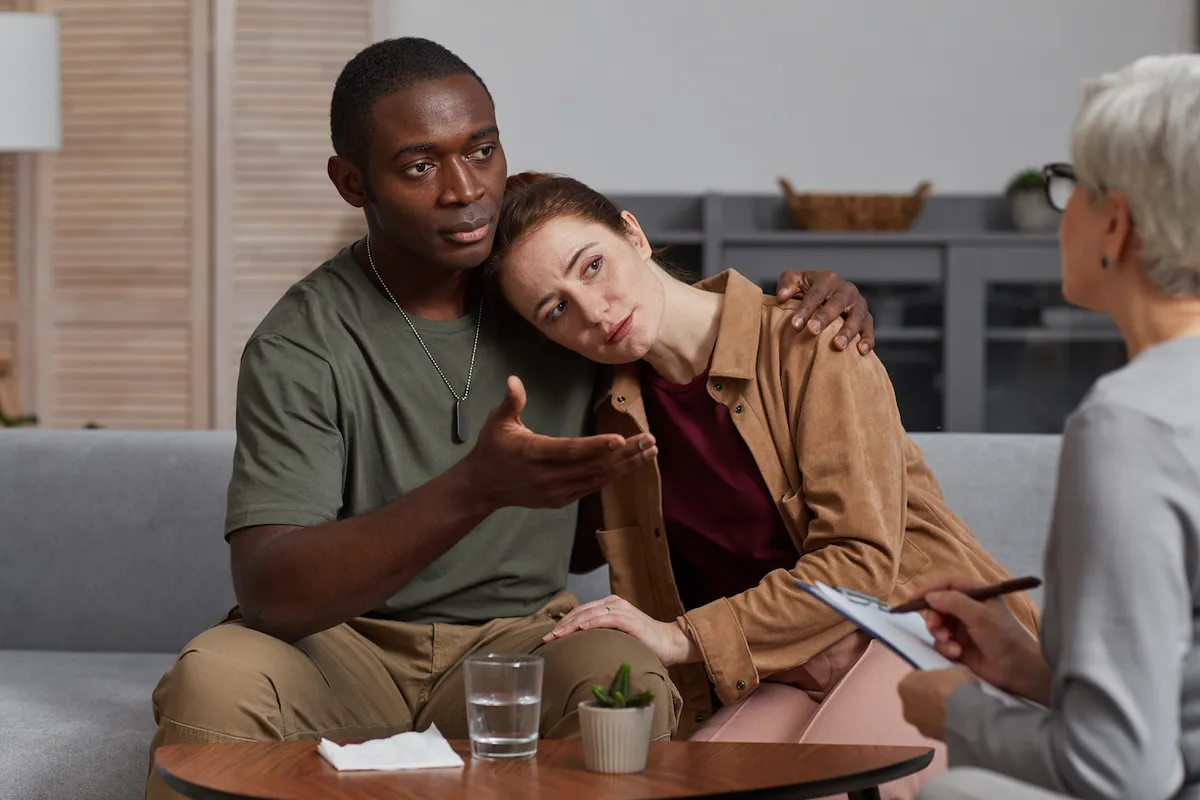
Many couples face bumps in their journey together. It's a fact that nearly 50% of marriages in the U.S. end in divorce or separation. This article will explore how couples therapy can offer tools and hope to strengthen your partnership.
Keep reading for insight and support!
What is Couples Therapy?
Couples therapy is a form of counseling that helps partners address and resolve conflicts, improve communication, and strengthen their relationship. There are different types of therapy techniques used to help couples work through their issues and improve their overall satisfaction in the relationship.
Definition
Couples therapy is a type of relationship counseling that helps people in romantic relationships to understand each other better, solve problems, and improve their relationship. It involves both partners sitting down with a trained therapist to talk about their thoughts and feelings.
The goal is to learn new ways to communicate, deal with conflict, and grow closer.
Marriage therapy or couples counseling can take many forms depending on the couple's needs. Some might use emotionally focused therapy to build stronger bonds. Others may need premarital counseling to prepare for marriage or family counseling if kids are involved.
The main idea is that a therapist guides the couple through tough issues so they can find solutions together.
Purpose
Couples therapy aims to help couples improve their relationship by addressing issues such as communication breakdowns, conflicts, and lack of intimacy. It provides a safe space for couples to work through their challenges and strengthen their bond.
The purpose of couples therapy is to equip partners with the skills needed to navigate difficulties effectively, foster understanding, and build a healthier relationship dynamic.
By learning effective communication techniques and resolving conflicts constructively, couples can rebuild trust, deepen emotional connection, and enhance overall relationship satisfaction.
Types of therapy
Couples therapy comes in different forms, each tailored to address specific relationship needs. Here are some common types of therapy:
- Behavioral Couples Therapy (BCT): This approach focuses on changing negative behavior patterns and communication styles.
- Emotionally Focused Therapy (EFT): EFT helps couples identify and restructure the emotional responses that drive their interactions.
- Integrative Behavioral Couples Therapy (IBCT): IBCT combines traditional behavioral couples therapy with acceptance-based strategies to improve relationships.
- Imago Relationship Therapy: This method emphasizes understanding childhood experiences to resolve conflicts and improve communication.
- Narrative Couples Therapy: In this approach, couples explore their life stories to gain insight into recurring relationship patterns.
How Couples Therapy Can Help
Couples therapy can help by improving communication, resolving conflicts, and building intimacy and trust in relationships. Through therapy sessions, couples can work on identifying and addressing issues that may be impacting their relationship.
Improving communication
Couples therapy helps improve communication between partners by teaching active listening, expressing feelings honestly, and understanding nonverbal cues. Therapists also guide couples in setting boundaries, using "I" statements, and practicing empathy to foster better understanding and connection.
Enhancing communication skills is crucial for resolving conflicts effectively and building a stronger foundation of trust and intimacy in relationships. Through therapy sessions, couples can learn to communicate with clarity, validation, and respect while addressing underlying issues that impact their ability to connect positively.
Resolving conflicts
Conflicts can be tough, but couples therapy can help. Therapists guide you to express feelings calmly and listen actively. You learn healthy ways to manage disagreements, finding compromises together.
By learning effective communication, you both gain skills in listening and understanding each other's perspectives. Therapy creates a safe space for expressing emotions without judgment or blame.
Gradually, conflicts become opportunities for growth rather than sources of distress.
Building intimacy and trust
Couples therapy helps in building intimacy and trust by creating a safe space for open communication. Through counseling sessions, couples can address underlying issues that impact their emotional connection, helping them rebuild trust and strengthen their bond.
Therapists use various techniques to improve intimacy, such as teaching effective communication skills and encouraging vulnerability in the relationship.
By addressing conflicts and working through challenges together, couples can develop a deeper understanding of each other's needs, fostering a stronger sense of closeness and trust.

Benefits of Couples Therapy
Gain a deeper understanding of your relationship and work on personal growth. To learn more about the benefits of couples therapy, keep reading!
Gain a deeper understanding of your relationship
Couples therapy helps you gain insight into your relationship dynamics. It provides a space to explore underlying issues and discover patterns that affect your connection. Through therapy, you can identify the strengths and weaknesses in your relationship, allowing both partners to understand each other's perspectives better.
This deeper understanding can lead to improved communication, empathy, and a stronger bond between you and your partner.
Therapy sessions give couples the opportunity to delve into their history together, addressing past experiences that shape their current interactions. By uncovering these influences, individuals can gain clarity on how they react to certain situations within the relationship.
Create a safe space for communication
In couples therapy, it's important to create a safe and supportive environment where both partners can express their thoughts and feelings without fear of judgment or criticism. This safe space encourages open and honest communication, allowing each partner to share their perspectives, concerns, and emotions in a respectful manner.
By establishing this safe space, couples can work through conflicts, build trust, and strengthen their bond by actively listening to each other's needs and working towards mutual understanding.
Effective communication in relationships is crucial for resolving conflicts, addressing intimacy issues, and fostering a deeper connection. Through the guidance of a couples therapist or counselor in therapy sessions, partners can learn constructive communication skills that promote empathy, validation of emotions, active listening without interruption or defensiveness which can empower them to better understand each other on an emotional level while working together towards solutions for their relationship distress.
Improve coping skills
Couples therapy can help improve coping skills by teaching effective stress management techniques and providing tools to handle challenging situations together. Therapists may guide couples in identifying triggers and developing healthy coping strategies, fostering resilience within the relationship.
Utilizing techniques such as mindfulness and communication exercises, couples can learn to support each other during times of stress, leading to a stronger bond and improved emotional well-being.
By addressing individual coping mechanisms and exploring ways to navigate difficulties as a team, couples therapy empowers partners to build a supportive foundation for managing life's ups and downs while strengthening their relationship bonds.
Work on personal growth
Couples therapy also focuses on personal growth. It helps individuals understand their own emotions and behaviors in the relationship. Through therapy, couples can work on self-awareness and develop strategies for personal improvement.
Therapists guide partners to recognize their individual strengths and areas for development. By addressing personal growth within the context of the relationship, couples can create a more fulfilling and supportive partnership.
Finding a Couples Therapist
When looking for a couples therapist, it's important to consider their qualifications and experience in working with relationship issues. Additionally, factors such as cost, online vs.
in-person options, and the process of starting therapy should be taken into account before making a decision.
What to look for
When seeking a couples therapist, consider the following:
- Qualifications: Look for a therapist with specific training and experience in couples therapy and relevant certifications, such as marriage counseling or family therapy.
- Approach: Choose a therapist whose approach aligns with your needs, whether it's cognitive-behavioral, emotionally focused, or solution-focused therapy.
- Compatibility: Ensure that you and your partner feel comfortable and understood by the therapist to establish trust and open communication.
- Confidentiality: The therapist should prioritize confidentiality and provide a safe environment for sharing personal relationship issues.
- Cost and insurance: Understand the fees involved, including session costs and insurance coverage, to make an informed decision based on your financial situation.
- Location and availability: Consider practicalities such as proximity to your home or work, as well as the therapist's availability for sessions that fit into your schedules.
- Reviews and referrals: Seek recommendations from trusted sources or read reviews to gauge the therapist's effectiveness in helping couples improve their relationships.
- Flexibility: A good therapist should be adaptable to different situations and able to tailor their approach to address the unique needs of each couple.
Cost
Couples therapy cost varies based on location and the experience of the therapist. In-person sessions can range from $100 to $250 per hour, while online options might be slightly cheaper.
Some therapists offer sliding scale fees or package deals for multiple sessions, so it's essential to discuss payment plans upfront. Insurance coverage for couples therapy may also partially offset costs, depending on your provider and the therapist's credentials.
When considering the expense of couples therapy, remember that investing in your relationship now could prevent more significant financial and emotional strains down the road as unresolved issues often result in separations or divorces with legal fees and division of assets.
Online vs. in-person options
Online and in-person therapy are two accessible formats for couples looking to seek professional help. Below is a comparison in HTML table format:
| Online Therapy | In-Person Therapy |
| Provides flexibility in scheduling | Offers a traditional setting for sessions |
| Allows for remote access from any location | Facilitates face-to-face interaction |
| Ideal for busy lifestyles or those with transportation issues | Can create a more personal connection with the therapist |
| May sometimes lack the personal touch of physical presence | Requires commuting to the therapist's office |
| Utilizes video conferencing, chat, and other digital communication methods | Depends on the physical availability of both partners and the therapist |
| Can be a preferred option during health crises, such as a pandemic | Provides a controlled environment tailored for therapy |
| Potentially more affordable without the need for physical office space | May involve a higher cost due to overhead expenses |
Every couple must weigh the pros and cons of each format to decide which suits their needs best.

Starting the process
To begin the process of couples therapy, you can start by researching qualified therapists in your area using resources like online directories and professional organizations. Take the time to read reviews and gather recommendations from trusted sources to find a therapist that aligns with your needs and values. Once you have selected a few potential therapists, reach out to them to inquire about their availability, approach to therapy, and determine if they are accepting new clients. After scheduling an initial consultation, prepare any questions or concerns you may have about the therapeutic process or your relationship to discuss during the meeting. It's important to approach this first meeting with an open mind and willingness to explore how couples therapy can benefit your relationship. Remember that finding the right therapist may take time, so be patient with the process and trust your instincts when making a final decision.
Conclusion
In conclusion, couples therapy offers practical techniques to improve communication, resolve conflicts, and build trust. By seeking therapy, couples can gain a deeper understanding of their relationship and develop effective coping skills.
The impact of these strategies can lead to significant improvements in relationship dynamics and overall well-being. Further resources on finding a couples therapist are available for those interested in exploring this option.
Making the decision to pursue couples therapy can mark the beginning of positive change and growth within relationships.
Get legally married online
In partnership with Courtly, get legally married online.
From start to “I do.” Courtly team is fully committed to the cause: getting you married. They've done more remote weddings than anyone. Thousands of couples have counted on Courtly and we know what it takes to secure your legal marriage certificate.
Also, enjoy an exclusive discount available only to the MarryOnChain community! Use code MARRYONCHAIN to get $75 off your wedding.
RelatedRelated articles
All posts




